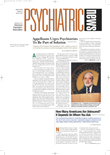Patients with rapidly progressing signs and symptoms of Parkinson’s disease have more than an eightfold increased risk of developing comorbid Alzheimer’s disease compared with patients who have little or no progression in Parkinsonian symptoms, according to new research.
In a cohort of more than 700 older persons examined for up to eight years, Robert Wilson, Ph.D., a professor of neuropsychiatry in the department of neurological sciences at Rush Presbyterian-St. Luke’s Medical Center and Rush Alzheimer’s Disease Center, and his colleagues have found that evidence of Parkinsonian signs at baseline was also loosely associated with an increased risk of Alzheimer’s. However, the link between the rate at which those signs progressed and the risk of developing Alzheimer’s was significantly more robust.
The study was reported in the April issue of Archives of Neurology.
“The new thing in our findings,” Wilson told Psychiatric News, “is the association to rate of progression of the Parkinsonian signs. The link to baseline presence of signs and increased risk of Alzheimer’s has been reported before, and we’ve replicated that here.”
The researchers used data from the Religious Orders Study, a longitudinal study of aging and the development of Alzheimer’s in older Catholic nuns, priests, and brothers across the United States. All study subjects, whose average age was 75.4 years, underwent extensive evaluations at baseline, including medical history, neurological examination, cognitive function testing, and reviews of any brain-scan films available.
A diagnosis of Alzheimer’s during the study period was determined using the criteria of the joint working group of the National Institute of Neurological and Communicative Disorders and the Stroke-Alzheimer’s Disease and Related Disorders Association, documented with an extensive list of cognitive function tests.
Parkinsonian signs were assessed by the Unified Parkinson’s Disease Rating Scale (UPDRS). That scale produces an overall rating from zero to 100, with higher scores denoting more signs and symptoms of Parkinson’s.
The 770 participants were followed with annual evaluations. Follow-up information regarding the development of Alzheimer’s was available for 746 (97 percent) of those participants, with an average length of follow-up of 5.6 years.
Over an average of 4.6 years, 114 of the study participants developed Alzheimer’s. (Five other persons developed dementia not related to Alzheimer’s and were excluded from the final data analysis.)
An initial analysis of the results revealed that for each point scored on the UPDRS, compared with someone who scored zero on the UPDRS at baseline, the risk of developing Alzheimer’s increased 4 percent.
“So, risk of disease was 40 percent greater in a person with a UPDRS score of 10, and 80 percent greater with a score of 20,” said Wilson.
When all the data were analyzed, however, the researchers found that by far the more significant correlation between Parkinsonian signs and risk of Alzheimer’s was the rate at which the signs progressed. Compared with the 21 percent of the cohort who had no progression on the UPDRS, the risk of Alzheimer’s more than doubled in the subgroup with the least progression, more than tripled in the moderate subgroup, and was 8.5 times greater for those with the most rapid progression in Parkinsonian signs.
The study participants agreed to donate their bodies after death for pathological examination. To date, about 250 have died, and about 90 percent of them have been autopsied, said Wilson. So far, patients diagnosed with Alzheimer’s during the study have had pathologic evidence confirming the clinical diagnosis.
“We believe there are three possibilities that could explain the link between Parkinsonian signs and Alzheimer’s,” Wilson said.
First, he said, pathologic changes common to Alzheimer’s that occur in the midbrain, specifically the substantia nigra, could be strongly contributing to the development of the Parkinsonian signs. That, he said, would explain both the progressive nature of the signs and their association with the development of Alzheimer’s.
Second, other pathology, such as that from cerebrovascular events, could be contributing to development of the Parkinsonian signs. And third, he said, the signs could be due to actual Parkinson’s pathology, such as Lewy bodies.
The team of researchers is going through the autopsy data to determine whether any of the three hypotheses is supported.
“The bottom line, though,” Wilson said, “is that anyone with Parkinsonian signs must be closely watched and screened for any signs of developing Alzheimer’s disease.”
Arch Neurol 2003 60 539
